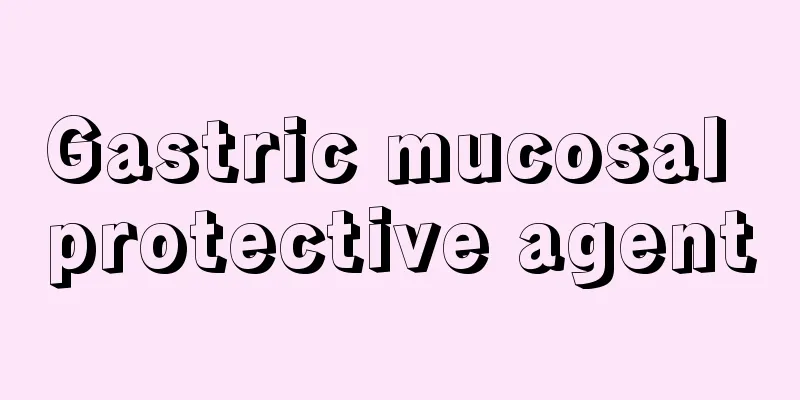Gastric mucosal protective agent

|
Bad eating habits have caused many people to suffer from gastrointestinal diseases. Many stomach problems are caused by lesions in the gastric mucosa. Gastric mucosal protectants are needed when treating stomach problems. Gastric mucosal protective agents have many functions and can also prevent gastric mucosal damage. There are many types of gastric mucosal damage, so they should be used under the guidance of a doctor. Gastric mucosal protective agents refer to drugs that can prevent and treat gastric mucosal damage, protect gastric mucosa, and promote tissue repair and ulcer healing. There are many types of gastric mucosal protective agents. Some have both anti-acid effects, such as alkaline bismuth carbonate; some also have the effect of killing Helicobacter pylori, such as potassium bismuth citrate and colloidal bismuth pectin. They can be roughly divided into the following categories: ① Colloidal bismuth agents. This type of drug has colloidal properties. After the small molecular acid radicals (such as citrate, nitrate, and carbonate) in the bismuth agent are replaced by macromolecular pectinic acid, the colloidal properties are enhanced. In an acidic environment, it can form a high-viscosity sol, which has a strong affinity with the ulcer surface and the inflamed surface. It can form a firm protective film on the surface of the gastric mucosa, enhance the barrier function of the gastric mucosa, and have a good therapeutic effect on peptic ulcers and chronic inflammation. ② Prostaglandins and their derivatives, such as misoprostol. This type of drug has a strong cytoprotective effect and can reduce gastric acid secretion by lowering cellular cAmp levels, thereby exerting an anti-ulcer effect. ③Others, such as sucralfate, gefuroxime, etc., protect the gastric mucosa and promote ulcer healing through different mechanisms. Adverse Reactions Gastric mucosal protective agents can cause constipation. Due to the insolubility and local action of bismuth, an ammonia smell may be left in the mouth while the medication is in use, and the tongue and stool may turn black and the teeth may temporarily change color, which will disappear on their own after the medication is stopped. Sucralfate is less absorbed after administration, so there are fewer adverse reactions, but gastrointestinal reactions such as abdominal distension and diarrhea may occur. Precautions Bismuth is contraindicated in patients with severe renal insufficiency and pregnant women. Sucralfate and bismuth have a protective effect on the gastric and duodenal mucosa in an acidic environment, so they should not be used in combination with alkaline drugs. Acid suppressants such as H2 receptor blockers and proton pump inhibitors reduce gastric acid secretion and may interfere with the absorption of sucralfate and bismuth, so they should not be used together. To prevent bismuth poisoning, the two bismuth agents should not be used together. |
<<: Esophageal and gastric mucosal heterotopia
>>: What does gastric mucosal lesions mean
Recommend
What should I pay attention to after cupping
Cupping in summer is actually a very good way to ...
Early symptoms and treatment of cerebral infarction
The brain is the most important part of the human...
How to grow muscles quickly through fitness?
Nowadays, people pay more and more attention to h...
Is collagen really useful
As we age, our cells will gradually lose their ac...
Which three places will cause pain in early stage breast cancer
Early breast cancer usually does not present with...
Do frequent colds indicate a serious illness?
Cold is a common disease in life, especially in a...
Medicine for curing deafness
When they get old, many people will say that they...
The difference between the black axis, blue axis, red axis and tea axis of the keyboard
People who work with computers often use keyboard...
What is the treatment for hemorrhoid bleeding
Nowadays, many white-collar women have a very hig...
How to treat excessive moisture and how to eliminate it in time?
In summer, it is easy for the human body to accum...
What are the symptoms of advanced lung cancer before death? What to do with the pain of advanced lung cancer?
Lung cancer is a serious threat to human health, ...
The difference between variable frequency air conditioner and fixed frequency air conditioner
Air conditioning is generally more commonly used ...
What are the symptoms of pubic folliculitis?
As long as there are pores, folliculitis may be c...
I suddenly got dizzy when I stood up. This is a good way to prevent it
Some female friends have had this experience: the...
What material is good for underwear? Is pure cotton good?
Underwear needs to be worn close to the body, so ...









